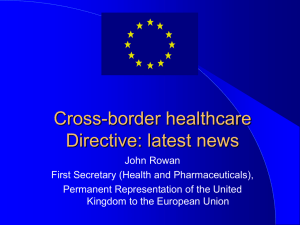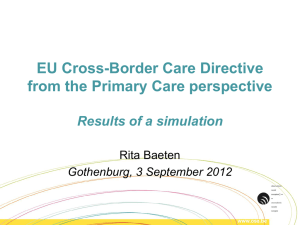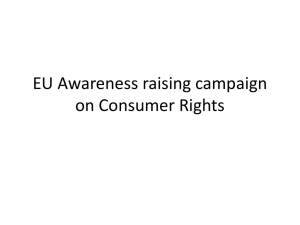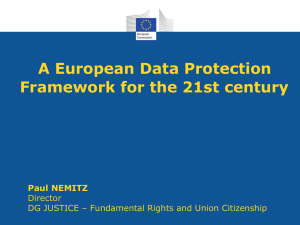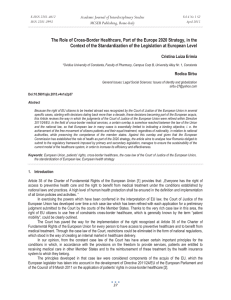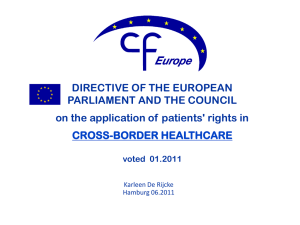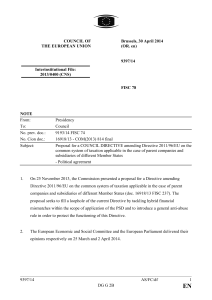Jooske Vos
advertisement
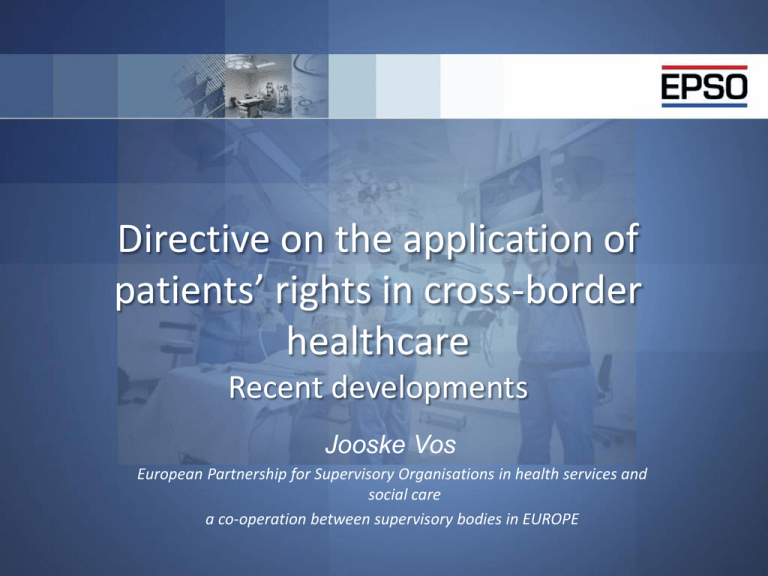
Directive on the application of patients’ rights in cross-border healthcare Recent developments Jooske Vos European Partnership for Supervisory Organisations in health services and social care a co-operation between supervisory bodies in EUROPE Directive on patients 'rights in cross-border healthcare Recent developments Presentation by : Jooske Vos Head of the EPSO Secretariat and director of EURinSPECT Main ‘Aims’ of Directive 2011/24/EU The main aims of the Directive: • Clarify the rights of patients seeking healthcare in another EU country, while being reimbursed by their national system. • Help patients exercise their rights of access to cross border care • Assure safety and quality cross-border • Make national health systems co-operate to achieve economics of scale ‘Main points’ of Directive 2011/24/EU as published April 4th 2011 Patients allowed to receive care in other MS than State of affiliation; Reimbursement may be limited by MS; Outgoing flow maybe ‘managed’ (by prior authorisation for certain types of healthcare and by ‘gate keeping’ principle (GP); Inflow maybe limited justified by ‘overriding reasons’ ; Information on safety and quality standards obliged ; Co-operation between MS necessary; Prescriptions between MS made possible . ‘Short History’ of Directive 2011/24/EU Towards a European policy of cross-border patients’ rights and cross-border healthcare: 1998 - EU Court of Justice starts cases Kohl/ Decker; 1998 -2011 Subsequent Court decisions; 2 July 2008 First draft directive by Commission to MS; 23 April 2009 European Parliament- first opinion; June 2010 Draft Directive (Agreement in Luxembourg; Final text adopted by EU in January 2011; Published 4 April 2011 in official Journal ; The Future of the Directive 2011/24/EU before 25 October 2013 (a lot of work to do) Member States have to adopt the necessary laws and regulations and administrative provisions Including for MST ( Member State of Treatment ) : Provisions to ensure access to good quality crossborder health care (art 4) standards and guidelines / information. Including for MSA ( Member States of Affiliation ): Prior authorisation ( in limited cases); Reimbursement procedures . The Future of the Directive 2011/24/EU Including : National contact point(s) per MS (art 6 ) ( information) Promotion of Co-operation in healthcare between MST Standards and guidelines on quality and safety laid down by the MST(art 4,1b ); Relevant Information including provisions on supervision and assessment of healthcare providers (art 4,2a); Relevant information to help individual patients make an informed choice (art 4, 2b); Transparent procedures in case of harm (art 4, 2c); Non discrimination to foreign patients (art 4, 3). What is interesting for supervisory bodies ? Main point The directive calls for: Relevant information on the standards and guidelines on quality and safety laid down by the MS of treatment, including provisions on supervision and assessment of healthcare providers; What is interesting for supervisory bodies ? The Directive implies the need for: • Efficient communication channels - also between supervisory bodies; • Network building on quality and safety ; • Relevant information on standards and guidelines on quality and safety laid down by the MS of treatment; • Provisions on supervision and assessment of healthcare providers; All European countries have to enhance their cooperation. How does EPSO fit in this process? Can we add our joint expertise? Questions or Answers on the questions of this presentation?
